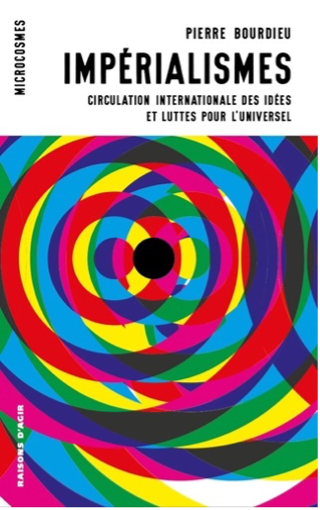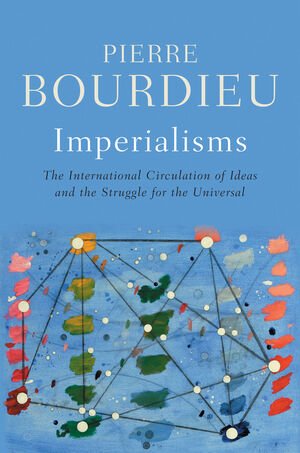Bourdieu, P. (2023) Impérialismes. Circulation internationale des idées et luttes pour l’universel, Paris: Raisons d’agir.
Julian Duval
Impérialismes is a posthumous volume by Pierre Bourdieu published in 2023. It brings together texts and speeches on the international phenomena, most of which are unpublished or difficult to access. Introducing the book, Franck Poupeau and Gisèle Sapiro point out that Bourdieu was always concerned with international phenomena and conducted his first research in Algeria in a colonial context. In the 1960s, Bourdieu began running a research center with a Euro-pean scope that included comparative research. From 1965 onwards, as editor of series of books in different publishing houses and later journals, he began introducing a number of foreign researchers in France. His reflection on the topic intensified in the 1990s, both in response to “globalization” and because he was traveling abroad more frequently, particularly in his efforts to launch transnational intellectual ventures. Most of the texts published in this volume date from this decade. The end of the book includes research carried out after the 1990s on international subjects inspired by Bourdieu.


The editors of the volume have distinguished four main themes: the first section, “Universalism and Domination,” brings together two texts by Bourdieu. The first analyzes the imperialism exercised by France and the United States in international exchanges, each of which is associated with forms of political universalism. The second deals with the way in which academic con-cepts related to the specificities of American society (multiculturalism, flexibility, globalization, underclass, race, and identity…) became a “universal common sense” in the 1990s.
A second theme is the international circulation of works; Bourdieu draws attention to the “import-export” ope-rations in intellectual life. He invites us to study the agents involved (states, publishers, translators, preface writers for foreign authors, etc.), the interests that drive them, and the transformations (liberating or destructive) that works undergo as they circulate. Translations are linked to the symbolic capital of the exporting country in the field in question as well as to the importing country’s interest in foreign literature. In a short text from 1985, Bourdieu discusses the dilemma of Belgian literature, which has attempted to establish itself within the borders of the Belgian state, but remains exposed to the domination of the French literary field.
The third section focuses on international comparatism. In one paper, Bourdieu states that his affiliation with French theory in the United States is an illustration of the allodoxia that can accompany the circulation of texts from one country to another. In a 1975 text, he posits that the presupposition in Ameri-can comparative studies that all societies aspire to the “modernity” of American society is evolutionist and nationalist. In an article from 2000, Bourdieu calls for reflexive work on national “scholarly unconscious,” and in a related seminar explains the necessity and difficulties of the comparative method; sociology must confront the existence of untranslatable words and realities specific to nations. He calls for exchanges between resear-chers from different countries with the shared goal of structural comparatism. When comparing countries, researchers must consider that each country is also comparing itself to others.
A final theme is the analysis of transnational fields. Bourdieu was interested in the Olympic Games, an international event disseminated via televised broadcasts with a nationalistic dimension that is shaped by the host country in question. He also looked at the development of multinational legal firms: such firms recruit cosmopolitan candidates, who experience social decline in their national field, but who advance a form of universality and contribute to the formation of the global legal field. In 2000, Bourdieu also analyzed “economic globalization” as a form of unification which, through political measures and the action of international institutions in the interest of a “global economic field,” works to the advantage of the United States.
Bringing these texts together has a powerful effect. The volume shows that the international dimension is for Bourdieu a major feature of the social world as it underscores a number of cru-cial research questions and perspectives. Throughout the texts, Bourdieu applies several of his main concepts to transna-tional objects of study: field, capital, habitus, allodoxia… Nonetheless, this collection of texts remains a posthumous book. We will never know if Bourdieu would have collected his reflections on the international phenomena in a sole volume, nor how he would have done so. For this reason, we should perhaps approach this volume with the intention to benefit from the editing work that facilitates the reading of rather disparate texts, while also bearing in mind that this work involves choices (of the title, the final selection of Bourdieu’s texts, and the perspectives adopted in the introductory and concluding texts) that potentially exclude other possibilities.
Forthcoming translations:
English
- Bourdieu, P. (2025) Imperialisms. The International Circulation of Ideas and the Struggle for the Universal. Cambridge: Polity. Translated by Collier, P.
Italian
- Bourdieu, P. (2025) Imperialismi. Circolazione internazionale delle idee e lotte per l’universale. Roma: Quodlibet. Translated by Boschetti, A.
Portuguese
- Bourdieu, P. (2026) Imperialismos. Circulação internacional das ideias e luta pelo universal. São Paulo: Edusp. Translated by Campos, N.
Croatian
- Bourdieu, P. (2026) Imperijalizmi. Internacionalna cirkulacija ideja i borba za univerzalno. Zagreb: Meandar. Translated by Sabljo, M. et Vodanović, B.
